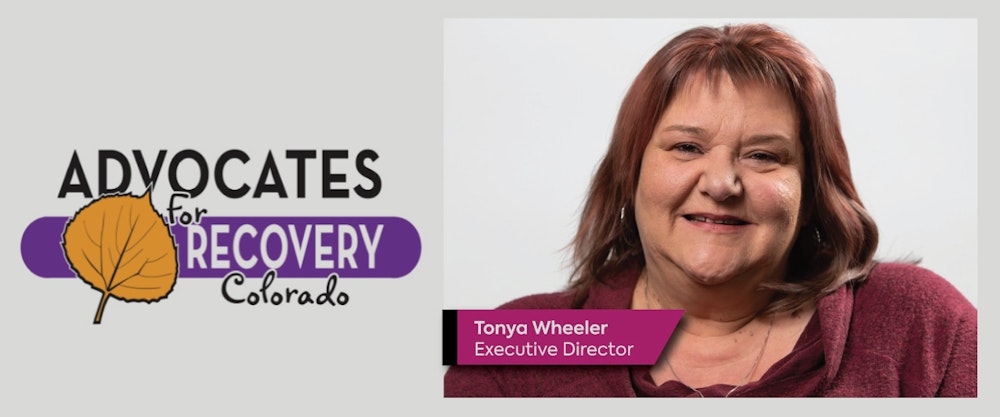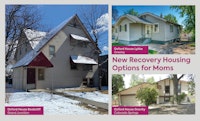
THE POWER OF PEERS.
An integrated approach to helping moms connect with each other and their community.
Tonya Wheeler, Executive Director
For moms and families who are in recovery from a substance use disorder, finding support for their mental well-being and a trusted social group is just as important as finding care for them physically. Advocates for Recovery Colorado (AFRC) recognizes the need for this integrated level of connection and provides unique support for those in recovery. The support comes in the form of peers who truly understand what it is like to be on this journey. All of AFRC Colorado’s recovery support services are free and no one is ever turned away. They work to reach underserved communities and they have offices in Denver, Aurora and Sterling and an office that serves Montrose and Delta.
Tonya Wheeler, Executive Director of Advocates for Recovery Colorado, said that they are a “Circle of Parents” provider – specifically working with parents who are in recovery. They offer social gatherings for these parents that includes dinner and free childcare. “Everyone working at AFRC is a peer with lived experience, including myself. ” Tonya explained. “We even have a woman on staff who lost her son to an overdose, so her passion and lived experiences help her relate to those who are family members and friends of someone dealing with a substance use disorder.” She is available to meet, for free, with those who are struggling with a loved one’s drug/alcohol use.
“We use the word surrender versus quit when we refer to recovery,” Tonya said. “Because when we surrender, we avail ourselves of new information. Only when someone gets to that place of surrender are they open to accept assistance from others, and that’s when it’s so powerful to have somebody who's been there, who's walked in those shoes. And when we remove the barriers of cost and insurance, people realize all they have to do is show up.”
Tonya believes that treatment happens within four walls, but real recovery happens in the community. People have to learn how to live in recovery in their community, and that often means rewriting their social networks. For people in a small town, it can be even harder, especially for moms. Tonya says, “It is critical to be there for people after treatment because when they go back to their community if they haven’t learned how to make new friendships and socialize, they are likely to repeat their past.”
Tonya’s insights and caregiving come from her own lived experience of being in recovery and practicing abstinence for over 31 years. “All the things that I share, especially with moms, are things that I've experienced myself,” she said. “I entered recovery in a little town in east Texas when my children were ages 5 and 1 and I had a woman who was in recovery and was like my second mom, and that woman saved my life. I needed my mentors then and still do today. I especially needed other moms. I needed people that I trusted that had children that I could share with, and talk about the difficulties of being a single mom, and being a parent, and being new in recovery all at once.”
“Moms with young children have enough self-doubt,” Tonya said. “They are often told, or it is implied, that they don’t deserve their kids, or that their kids would be better off somewhere else. And that can cause these moms to throw in the towel. But at AFR Colorado, we give them positive support. Here, another mom will put her arm around her and say, ‘It's okay, because I've been there, and I doubted myself too. Come on, I will hold your hand a walk with you.’ And that there's not a charge for that. There's not a barrier to that. And when the kids of these parents in recovery start to play together, we are helping them grow up in a different environment. We are breaking the cycle of multi-generational family addiction and mental health issues. We are helping to change the whole family dynamic.”
AFR Colorado, focuses on four different kinds of recovery capital.
Personal recovery capital: Things that are tangible including safe housing, bank accounts, a person's basic needs. Do they have safe, substance-free housing or shelter? It also includes things like someone's self-esteem, their interpersonal skills, their values, their sense of meaning and purpose in life.
Family and social recovery capital: This relates to the intimate relationships that they have and their friendships, and relationships with people in recovery and their supportive partners.
Community recovery capital: This is about policies, resources and attitudes that are specifically related to helping people in their recovery. Where are opportunities for the community to come together and to connect people?
Cultural capital: This is the understanding that we need to connect services to a person’s culture. Everyone has different identities tied to different groups that they feel connected to, and those identities bring different ideas, perspectives, and values to how someone chooses to find recovery.
Share this article:








